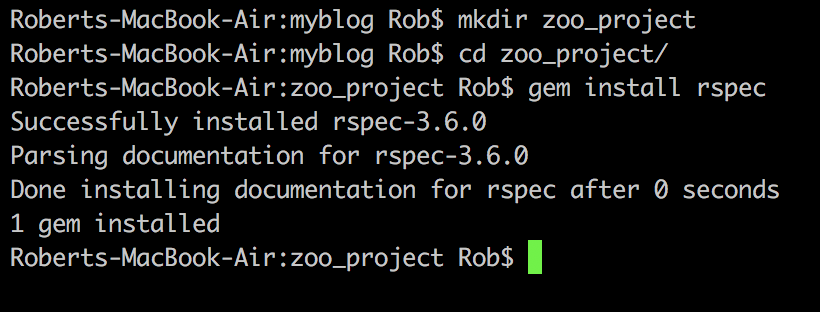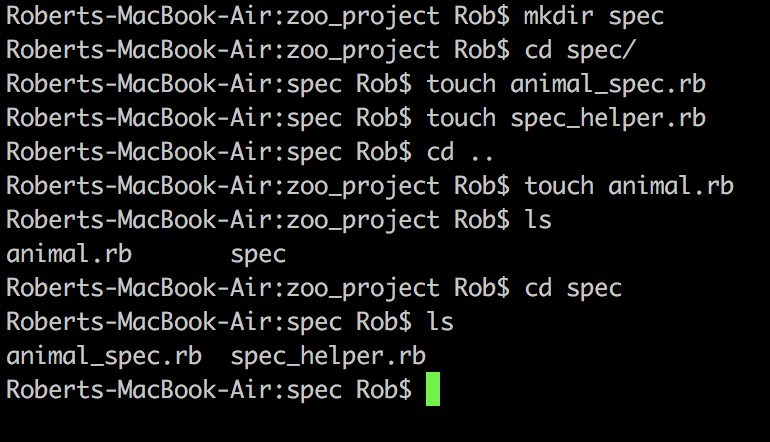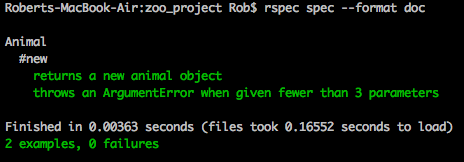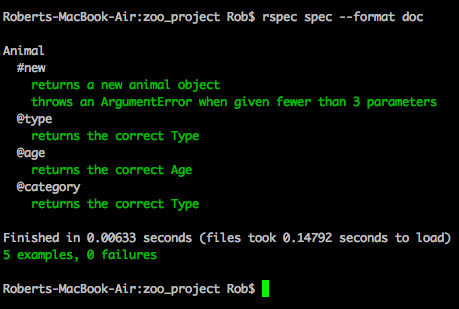Testing in Ruby with RSpec
The topic of writing your own tests has been frequently coming up in the last few lectures/coding meetup events I’ve attended. It had me thinking about my deficiency in writing tests for my own projects. One of the best ways I’ve found to learn is start a mini project and write my own tests.
For this example we’re going to start with creating a single class and writing specifications (specs for short) for an instance to pass. Let’s build an animal class that has three parameters that need to be passed in upon initialization for a valid instance. Before that we’ll need to create our project and add our spec gem to write the necessary tests.
I’ve created a directory called zoo_project and ran the command gem install rspec to add our testing framework.

Next we’ll need a spec directory to hold all the testing files we’ll be writing. We will also need the actual class file to creat instances of that particular class for testing purposes.

In our spec_helper.rb file we can include the animal.rb file’s relative path so it knows how to implement the tests we’ll be writing. At the top of the file include the line require_relatve '../animal'.
Now let’s get writing some actual tests for our Animal class. We can namespace the tests we want to write for our Animal class by writing our initial block as follows…
require 'spec_helper'
describe Animal do
before :each do
@animal = Animal.new "type", "age", "category"
end
end
Here we’ve described what we’ll be testing - in this case it’s our Animal class we’re testing that takes a block of code do and end. The way this is structured tells the user the tests that follow this line of code are meant for that specific class. We’ve also included a before block. A before block of code is run before any of the tests are executed as they will be dependent on an instance of an Animal.
Let’s now write a test that describes that our new method should be an instance of the Animal class.
require 'spec_helper'
describe Animal do
before :each do
@animal = Animal.new "type", "age", "category"
end
describe "#new" do
it "returns a new animal object" do
expect(@animal).to be_an_instance_of Animal
end
it "throws an ArgumentError when given fewer than 3 parameters" do
expect {Animal.new "type", "age"}.to raise_exception ArgumentError
end
end
end
The describe '#new' do block is very readable, very Ruby, and does exactly as it sounds. We’re writing tests within this block of code to ensure the new method returns an Animal object and throws an error if an incorrect number of parameters are passed on the initialize method. Before we can test our tests, we’ll need to define our Animal class and write the intialize method. In our animal.rb file add this line of code.
class Animal
def initialize(type, age, category)
@type = type
@age = age
@category = category
end
end
Now we can see if our two tests we’ve written actually work. Run this line of code in the home directory rspec spec --format doc.

Awesome! Green is always a good sign when testing. For our last bit in this tutorial let’s go ahead and write tests for the actual attributes we want an Animal to possess.
Add these tests just below the #new block of tests so we can ensure the attributes of an Animal align with before :each Animal instance.
describe "@type" do
it "returns the correct Type" do
expect(@animal.type).to eq "type"
end
end
describe "@age" do
it "returns the correct Age" do
expect(@animal.age).to eq "age"
end
end
describe "@category" do
it "returns the correct Type" do
expect(@animal.category).to eq "category"
end
end
Here we’re describing what the return value should be when we’ve set up our Animal initialize method correctly. Each attribute should return their respective value as defined in our before :each block of code. The last thing we need to do is define those methods on our Animal class. The easy way to do so is through our attr_accessor methods. Add this line of code above the initialize method to our animal.rb file attr_accessor :type, :age, :category. Let’s run our test one final time and ensure all is right with our mini project.

Questions or comments? Feel free to shoot me an email (click the link below).